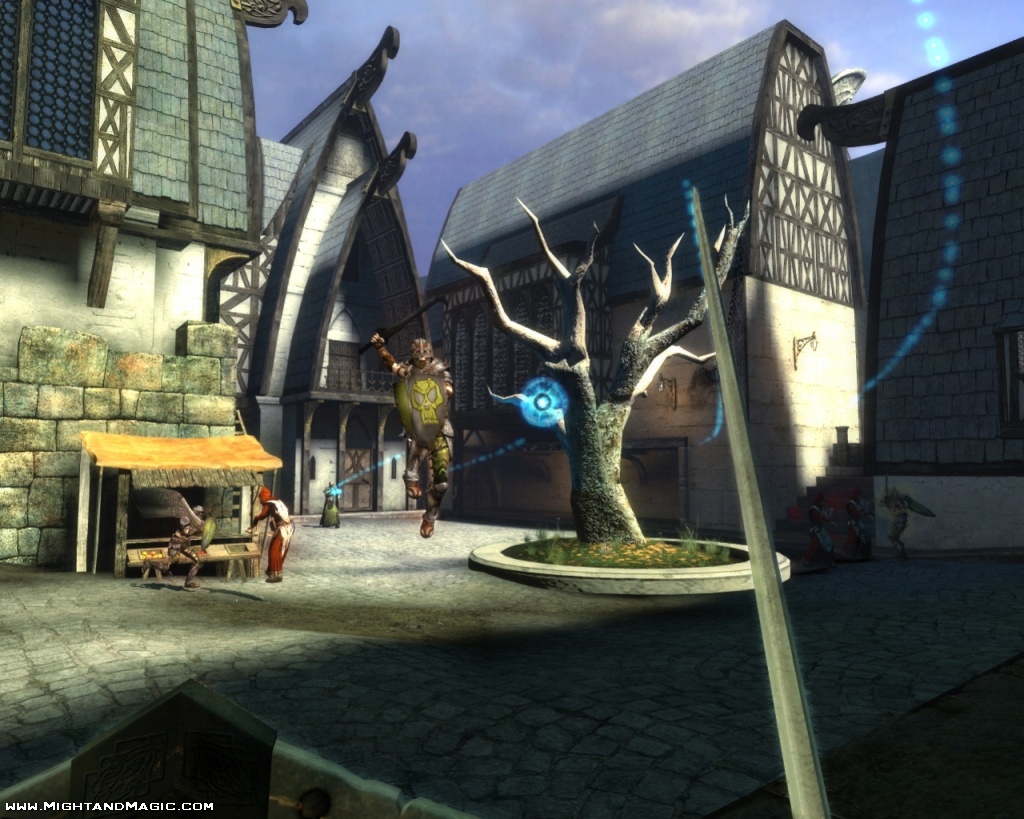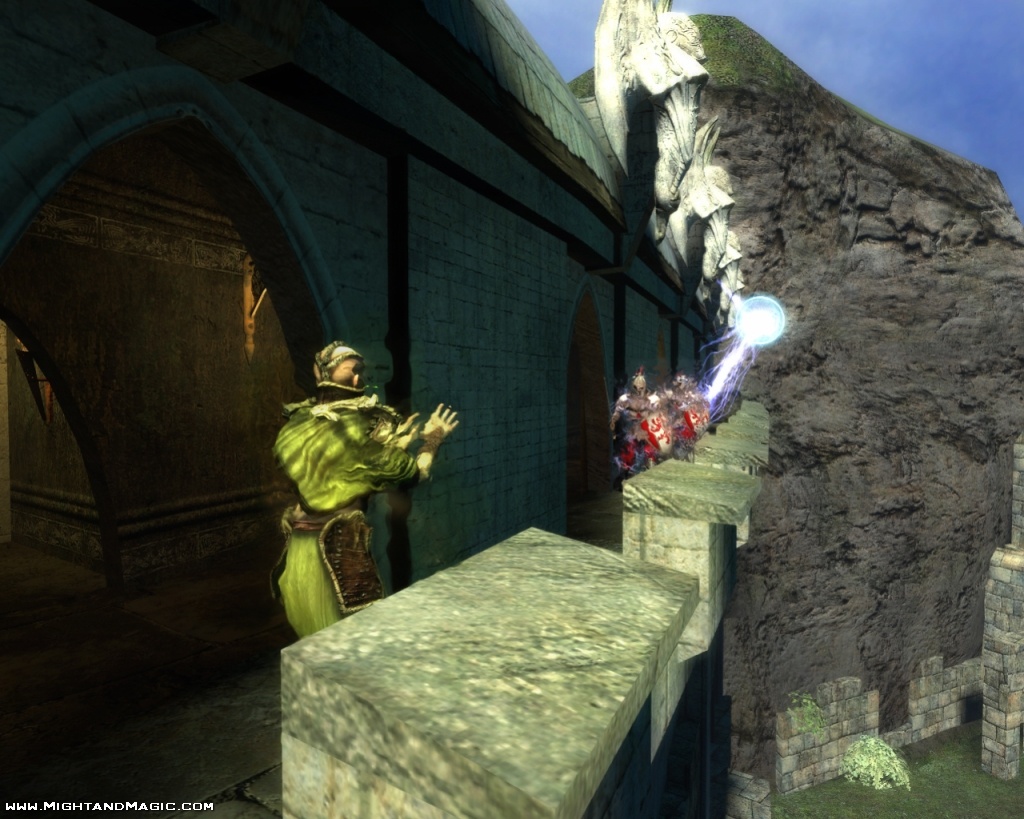Dark Messiah of Might and Magic Updated Hands-On - Multiplayer, Classes, and Physics Sending Guys Flying
We log in some time with the action-packed, class-based multiplayer in this fantasy-themed PC action game.
Dark Messiah of Might and Magic, the upcoming action game from developer Arkane Studios and publisher Ubisoft, is what happens when you combine the fantasy lore of the Might and Magic universe, the multiplayer know-how of Battlefield 2, and the explosive physics of the Source engine. The game will feature a highly open-ended single-player game that will let you end the miserable lives of ugly, ferocious monsters in all kinds horrible ways, with swords, sorcery, arrows, or one of many different kinds of environmental traps that take advantage of the same physics that powered Half-Life 2. But it will also offer class-based, online multiplayer play with a highly unusual, persistent "campaign" that will let you carry your achievements into the next round.

While Dark Messiah will apparently ship with standard head-to-head deathmatch, its primary multiplayer mode will be "crusade" mode, which will pit a team of human warriors against a team of undead minions. From what we can tell so far, there won't be any significant gameplay differences between undead and human characters, but which side wins each battle will definitely affect a crusade match's outcome. The multiplayer game will take place in a portion of Ubisoft's revised Might and Magic fantasy realm--the same realm that the French publisher created from scratch for its recent PC strategy game, Heroes of Might and Magic V. (In fact, the crusade multiplayer mode is intended to be a prequel to Heroes V, a game in which the lands of the humans were invaded by undead marauders.)
The first battle of any new crusade match will take place on a central map, and the victorious team will actually bump the two sides to a specific next map. If the humans win the day, the next battle will take place on a mountainous map called Nelsham's Scar, whereas if the undead win the first battle, the next match will take place on a map called Vradek's Crossing. Eventually, the team that manages to win several times in a row will push the opposing team back to its stronghold, where a final battle will take place.
Though the multiplayer mode is in full production at Kuju Entertainment in the United Kingdom, its design is being spearheaded by Arkane designer Romain de Waubert de Genlis, a former producer and designer on the Battlefield multiplayer shooter series. Crusade, like Battlefield's conquest mode, will focus on capturing and holding various control points scattered throughout the map--control points that become "spawn points" (places where you can jump into the game again after you're killed in battle) when your side controls them. From what we can tell, most maps will start each side on opposite ends, with a few points near each side's rearmost control point. Though the maps we played on weren't perfectly symmetrical, we saw several instances of teams quickly snagging the first few control points, making coordinated rushes toward the middle of the map to seize the central point, and moving onward into enemy territory. Like with the Battlefield series, losing control points or dying will cost your team points, which decrease over time.

However, unlike the Battlefield series, Dark Messiah will have a set of character classes inspired by medieval fantasy. The game will offer five different professions you can play as: the archer, the mage, the priestess, the warrior, and the assassin, all of which share some of the abilities of the single-player game's hero, Sareth. However, unlike Sareth, who uses both swords and sorcery, the multiplayer classes are more specialized--but they can also expand on their powers as they gain additional points for successfully defeating their enemies, capturing control points, and aiding their teammates. In addition, all classes have a stamina bar that determines how long they can continuously sprint (warriors are the worst sprinters, while assassins are the best), as well as health and energy meters that determine how much punishment they can take and how often they can use their special abilities, respectively.
Of the five classes, archers are the closest to a standard first-person shooter character, since they fire single arrows at their target. However, because of the game's Source-powered physics modeling, archers have to compensate for gravity and height differences (arrows aren't just straight shots--they'll actually dip downward over time), but they can also upgrade their arrows once they gain enough points. Mages are the game's heavy artillery and can specialize either in lightning or fire magics. At the beginning, mages are extremely weak, but once they gain enough points, they mature into devastating combatants that can send their enemies hurtling through the air, head over heels (thanks to physics), with explosive spells.
Priestesses can access a unified healing/harmful ability that automatically aids any nearby teammates and damages nearby enemies. The priestess class isn't about precise aim, but it can still provide great support for teammates and can also resurrect fallen teammates (who leave glowing skull icons behind that represent their souls) or devour the souls of fallen enemies to make sure they can't be revived. Warriors are the game's best melee combatants and use swords to attack (by left-clicking the mouse) and shields to block incoming attacks (by right-clicking the mouse). As warriors increase in level, they also gain powerful melee abilities, such as a headlong charge attack that can knock enemies off their feet. Finally, the assassin class uses twin daggers to dispatch enemies from behind, and can also learn techniques like laying traps and enhanced stealth that causes them to become mostly invisible. Like in the single-player game, left-clicking and holding the mouse using assassin's daggers causes you to ready and hold for a strike; if you can successfully deliver this attack from the rear, even if you aren't hidden by stealth, your assassin's arms will change their position to an overhand blow, and you can let go of the mouse button to instantly kill your foe.

Each of the game's classes seems to have a place on the battlefield, and each one is deadly if played well. For instance, it seems tempting to write off the warrior as perhaps being the least exciting class, since you generally have to get in close and repeatedly swing your sword; but the warrior is the absolute toughest class in multiplayer, and no other character--except another warrior--can stand up to a warrior's melee attacks. Assassins can upgrade themselves with enhanced stealth ability and an extended stamina bar that lets them sprint over much longer distances. Because assassins can instantly kill any enemy from behind, they can seem like absolute terrors on the battlefield, especially if they can sneak around a crowd of enemies trying to hold on to a control point (we assassinated as many as three enemy players, one after another, in just seconds), but they're weak as kittens once warriors start pounding on them or once they start getting blasted by enemy magic. Priestesses don't seem like they do well in battle, but by hanging back behind their allies, they can heal their teammates continuously as long as they have enough energy, and they can later learn useful spells like an entangling enchantment that slows any incoming foes. In a pinch, both mages and priestesses can swap out their finger-waggling for their trusty quarterstaves, which they can use to parry some melee attacks.
From what we can tell, Dark Messiah's multiplayer is not only fast-paced and brutal, but also packs in a lot of depth that should give players plenty of incentive to keep playing past round one. The game is scheduled for release later this year.
Got a news tip or want to contact us directly? Email news@gamespot.com
Join the conversation